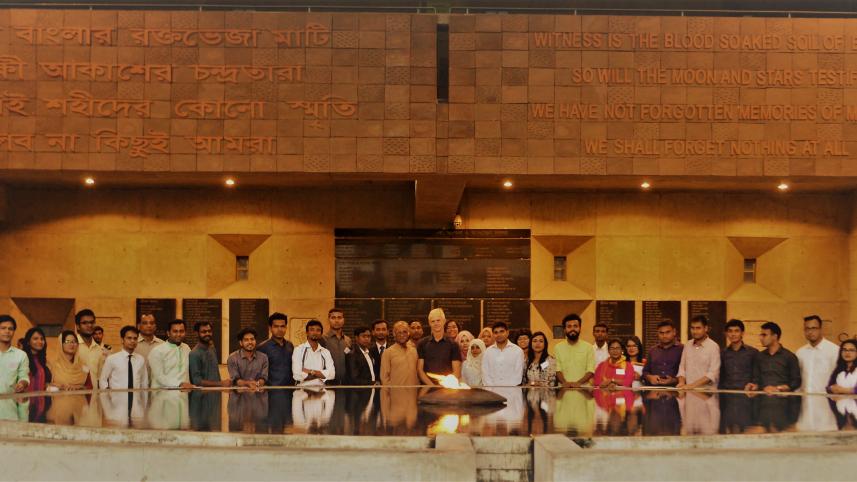Workshop on International Human Rights and Criminal Law held at Liberation War Museum

The Center for the Study of Genocide and Justice (CSGJ), Liberation War Museum (LWM) organised one and half day long workshop titled “Practical Applicability of International Human Rights and Criminal Law”, with the participation of 46 students of various disciplines, among 14 public and private universities and 3 research institutions.
The workshop was conducted by Australian Barrister Mr. Patrik Anthony Burgess, the President of Asia Justice and Rights (AJAR) and Senior Advisor on Rule of Law Projects in Myanmar, Indonesia and other South East Asian countries. Mr. Burgess was formerly the Asia Director for five years for the International Centre for Transitional Justice (ICTJ), Director of Human Rights for two UN Peacekeeping missions in East Timor and Principal Legal Counsel for three years at the East Timor Truth and Reconciliation Commission.
In the workshop, Mr. Burgess spoke about different dimensions of practically applying International Human Rights and Criminal Law in present world order. Historical approach and mechanism of Transitional Justice were also discussed thoroughly. Mr. Burgess explained four components of Transitional Justice, namely prosecution, reparation, truth seeking and institutional reform.
According to him, prosecution includes the investigation and prosecution of serious international crimes, such as genocide, crimes against humanity and war crimes. In strengthening the rule of law, it facilitates the ways of sanctioning those who violate laws with criminal penalties. It also demonstrates that crime will not be tolerated, and that human rights abusers will be held accountable for their actions. The International Criminal Court (ICC) and hybrid courts/tribunals such as ICTY, ICTR, ECCC, SCSL, etc. are the vital components of prosecution initiatives.
Reparations aim to repair suffering of the victims of human rights abuses. They seek to make amends with the victims, help them overcome the consequences of abuse, and provide rehabilitation.
Truth seeking encompasses initiatives allowing actors in a country to investigate past abuses and seek redress for the victims. By these processes, it enables the conflict-stricken societies to examine and come to terms with past crimes and human rights violations in order to prevent their recurrence. Documentation and memorialisation for preventing future atrocities is one of the main purposes in truth seeking. They can also help the victims by knowing the truth about what actually happened to people and understanding the atrocities they endured. It includes the collection of memories and building memorials.
Institutional reform extends to public institutions like the police, military and judiciary which often contribute to deal with human rights violations that are needed to be reformed.
Mr. Burgess then shared his personal experiences regarding genocidal atrocities, the issue of justice and his recent Rohingya Camp visit. Documentary based on real life genocidal consequences were later exhibited for the participants.
Attending the closing ceremony of the workshop, the CSGJ Director Mr. Mofidul Hoque hoped that the young and future generation will embrace the spirit of justice and stand against all sorts of atrocities with a faith and commitment that the youths have that potentials to be involved in humanitarian activities to make a better world for all. Upon the successful completion of the workshop, the participants were provided with certificates.
The event was covered by Sujana Sabrin and Saima Siddika, Students of Law, Bangladesh University of Professionals (BUP).



 For all latest news, follow The Daily Star's Google News channel.
For all latest news, follow The Daily Star's Google News channel.
Comments